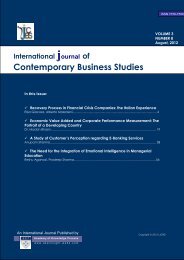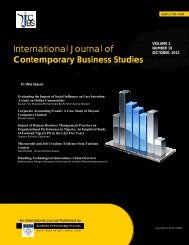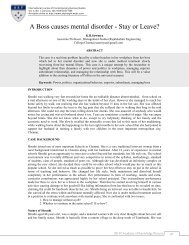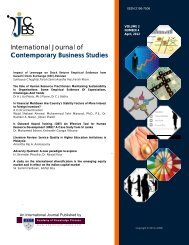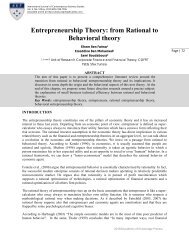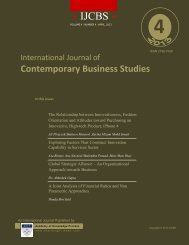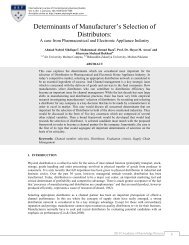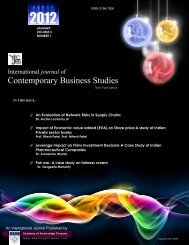Contemporary Business Studies - Academy of Knowledge Process ...
Contemporary Business Studies - Academy of Knowledge Process ...
Contemporary Business Studies - Academy of Knowledge Process ...
You also want an ePaper? Increase the reach of your titles
YUMPU automatically turns print PDFs into web optimized ePapers that Google loves.
International Journal <strong>of</strong> <strong>Contemporary</strong> <strong>Business</strong> <strong>Studies</strong>Vol: 4, No: 2. February, 2013 ISSN 2156-7506Available online at http://www.akpinsight.webs.com5.4 Relationship between Life Satisfaction & Gender effectsMortazavi et. al (2009) in their study tried to understand the individual experiences <strong>of</strong> work familyconflict across three different countries and cultures i.e. Ukraine, Iran, and the US. The relationshipbetween gender, nationality, and cultural values <strong>of</strong> horizontal individualism and collectivism measured atthe national and individual levels revealed no differences in the amount <strong>of</strong> conflict experienced acrossUkraine, Iran, and the US. This research showed that there is a negative relationship between work-t<strong>of</strong>amilyconflict and horizontal allocentrism (collectivism) at work and family. Idiocentric (Individualistic)employees reported less family-to-work conflict at work. In another study aimed at addressing theimportance <strong>of</strong> work-life balance and the associated gender differences therewith, (Smith, Smith &Brower, 2010) found that work-life balance is very important in career decisions. Their findings alsorevealed that a healthy work-life balance is associated with job satisfaction, job performance, and ethicaldecision-making. (Ergeneli, Ilsev & Karaapinar, 2010) investigated the effects <strong>of</strong> gender and interpretivehabits (deficiency, /necessitating, skill recognition) on the relationship between work–family conflict(WFC) and job satisfaction. The results suggest that interpretive habits moderate the relationship betweenWFC and job satisfaction such that the negative effect <strong>of</strong> WFC and job satisfaction is stronger foremployees focusing highly on deficiency, with high necessitating, and low skill recognition, referred to asstress-predisposing interpretive habits. Furthermore, WFC had a negative association with job satisfactionfor stress-predisposed male employees while no relationship was found between WFC and jobsatisfaction for men with a low focus on deficiency, low necessitating and high skill recognition namely,stress-resilient interpretive habits. Moreover, although WFC had a negative association with jobsatisfaction for female employees, this relationship was even stronger for stress-resilient females. In a rareand interesting study, (Powell & Greenhaus, 2010) examined whether gender, identity, boundary, and roletheories explained effects <strong>of</strong> sex on work-to-family conflict and positive spillover for full-time managersand pr<strong>of</strong>essionals. Women were found to experience higher positive spillover than men, primarilybecause <strong>of</strong> higher femininity. Although women did not experience different levels <strong>of</strong> conflict than men,individuals who scored higher on measured family role salience, which was positively related t<strong>of</strong>emininity, experienced lower levels <strong>of</strong> conflict. Role segmentation not only reduced conflict but also hadthe unintended consequence <strong>of</strong> reducing positive spillover.5.5 Relationship between Life Satisfaction & Time effectsIn a study by (Karimi Leila, 2008) on Iranian employees from a variety <strong>of</strong> organizations, using a sixdimensionalmodel <strong>of</strong> work-family conflict (Time, Strain & Behavior based WFC & FWC), supported thegeneralizability <strong>of</strong> the six dimensional model <strong>of</strong> work-family conflict across cultures. The results alsoshowed that the experience <strong>of</strong> time-based work-to-family conflict was greater than the others. In a similarstudy on the interaction <strong>of</strong> managerial workload with time flexibility and task autonomy to predict thedivision <strong>of</strong> household labor (division <strong>of</strong> housework activities) and its influence on family satisfaction,Mayo, Pastor & Sanz (2008) found that time flexibility and task autonomy at work moderated therelationship between managers work demands and their spousal ratings <strong>of</strong> housework overload. As timedemands increased, managers with low time flexibility contributed less than their spouses in householdwork (as reported by the spouse) than managers with high flexibility. A similar pattern emerges regardingtravel and task autonomy. In turn, spousal housework overload had a negative impact on familysatisfaction. In a rare study by Mitchelson K. Jacqueline (2009) on the relationship between perfectionismand perceptions <strong>of</strong> work family conflict established that perfectionism predicts work-family conflict,beyond the effects <strong>of</strong> the Big Five, trait affectivity and achievement. Further, findings indicate those withadaptive perfectionism (AP; work and home) tend to have lower strain and time-based family interferingwith work and lower behavior-based work interfering with family, compared with maladaptiveperfectionists (home) and non-perfectionists (work and home).2013©<strong>Academy</strong> <strong>of</strong> <strong>Knowledge</strong> <strong>Process</strong>35



